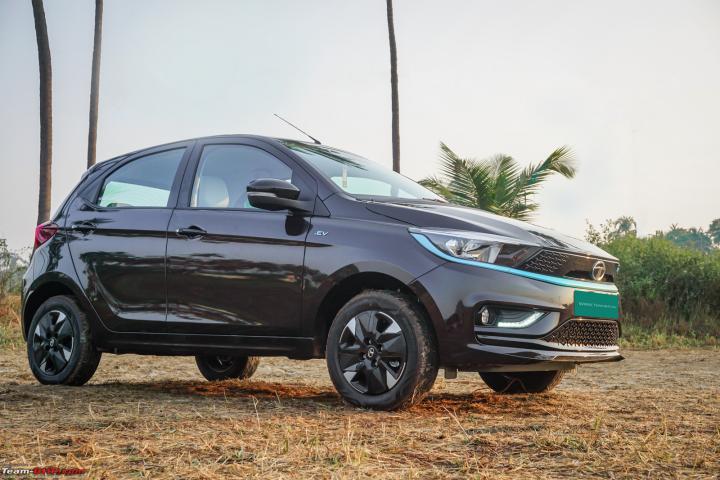News
Checklist to follow when evaluating preowned electric cars (EV)
Buying an EV with newly replaced-under-warranty batteries is similar in principle to an ICE car with a newly replaced timing belt/clutch
BHPian supermax recently shared this with other enthusiasts.
The market for used EVs:
EVs are gaining popularity in India, like in the rest of the world, but India perhaps doesn't have a mature used EV market yet, as the only EVs that show up on the used market are likely those sold by buyers regretting a hasty and ill-thought out EV purchase. In other parts of the world though, the penetration of EVs is much more and so their presence on the used market too is for reasons similar to ICE cars; users upgrading to other EV models, switching to models with enhanced ranges or features, leased out EVs upon completion of the lease period, and a small number of owners trying to get rid of their EVs while their batteries are still usable, to avoid getting stuck with a dead white elephant on their hands, post warranty expiry.
How do batteries grow old and die?
With ICE vehicles, calculating wear and tear is a relatively easy task. An inspection of the clutch plate would show how much life remains, and timing belts have a well established life-time, and as long as one knows how old a car is and how much it's rolled, it's easy to compute the remaining life of components, but how is it with batteries? Is the drop off linear, or does it tend to go downhill fast, after a point? Buying an EV with newly replaced-under-warranty batteries is similar in principle to an ICE car with a newly replaced timing belt/clutch; it would be expected to have a nice extended run with just the basic maintenance, but surely a battery that is old and out of warranty is quite a different scenario, given that battery replacement costs would be a very high percentage of the entire car's cost, unlike with ICE cars. What is therefore a good threshold in terms of age, to buy a used EV? How old can an EV be and still be sold in good faith and can be bought without one risking being called rash?
Differences between used hybrids and pure EVs:
While evaluating used cars, are used EVs and used PHEVs/hybrids evaluated similarly? Or is it a lower risk to buy a much older hybrid, than it is to buy a pure EV? A friend who was looking for a car with a rather tight budget wondered about the idea of buying a nearly 10-year old Prius, but she ultimately decided that the risk would be too much, given it's advanced age, and decided to buy an ICE car instead, and save up towards an EV purchase for later.
Loans for EVs vs ICE:
Another interesting point is the financed used car segment, which is fairly large, abroad. Will banks or financial institutions be willing to lend money to EV purchases as willingly as they do with ICE cars? If a user can't pay his/her EMIs, the bank repossesses the used car, but would they be able to recover their loaned money on a car that was already an old EV when repurchased, but after a bit of time would be even less of a hot-cake to sell? Even if the banks get burned in a few cases, they are likely to clamp down harder, making it potentially even harder to find buyers for used EVs.
Here's what GTO had to say on the matter:
I would generally avoid the earliest electric cars from any car manufacturer. It's the beta car, the one that they are learning this new technology from. There would be rough edges & you could expect bugs / niggles. In fact, I would avoid the 1st-generation EVs from most OEMs.
Would wait for the product to mature, or the next generation EVs. As the manufacturer learns EV tech, the product also significantly improves.
Here's what BHPian ferrarirules had to say on the matter:
I think it is easier to buy second hand EV cars - Following are the things that i will look for:
- Warranty left - 8 yrs or 1,60,000 kms which is standard for most cars for the motor and battery.
- State of Health for battery (SOH%) - Service center can easily tell this number. Higher the number better.
- Rest is physical inspection of the car for any crashes damage or obvious mechanical issues.
As there are less components in an EV car so there is no much to check. And things like brake pads and tyres have very low wear.
BHPian supermax replied:
Thanks for helping by putting in numbers, as they make it easier to make decisions. In Sweden, EVs are most popular with those who have long commutes but don't necessarily do very long trips, as it gives them the best of both the worlds, as they save heavily on fuel costs, and still not be bothered by range anxiety. My friend has a 50 km commute for example, and therefore logs around 2500 km per month, or 30k km a year, so she'll cross 160k km in year 6 of her car ownership. I'm not entirely sure if all EV makers give a 8 year warranty here, but I'll ask and update here. High quality ICE vehicles here routinely cross 250k km, I'm talking about Volvos, VWs, Toyotas, so having a max limit of around 160 k km or below 6 years of usage makes it more limiting for used EVs.
What this information tells me is that formerly leased EVs are probably excellent to buy, as leased cars generally have stricter mileage limits, meaning that a 3 year old EV would not have run more than 50k km, allowing at least 3-4 years of additional use, and if the battery really does have an 8 year warranty, it could potentially even get a free battery replacement, making it a very sweet deal. What to avoid though would be privately owned EVs which would have logged significantly more miles. If they have recently got a battery replacement, they'd still be good buys, but otherwise, they would be best avoided, as the battery is likely to fail post warranty-expiry, turning it into a nightmare.
Here's what BHPian montsa007 had to say on the matter:
Although I have no plans to buy an EV right now (the tech being still in its infancy stage in India the costs are high), if it were affordable would check the following things:
- What brand is it from (Since some brands have a history of pulling the plug on their projects).
- How old is the car.
- Battery health / Warranty left.
- State of the car (Wear and tear, dents, accidents if any).
- Insurance cost, Additional cost involved and the support provided by the company like shifting the charging station.
- Service Centre presence in my city.
Hope this helps.
Here's what BHPian Jeroen had to say on the matter:
In the USA most current EVs come with 200-300K miles warranty on the battery. Soon the last thing to worry about is the battery.
Not sure, every EV is different, but there must be onboard diagnostics that can tell a pretty good story about the state of the battery. (Beyond what the owner can already see)
I would be interested to see how other parts wear. EVs are heavy and fast. That puts a lot of strain of things like bearings, brakes, suspension and so on.
They also have way more electronics and wiring. Those age too. In my opinion we should start with a blank sheet of paper when it comes to a checklist for second hand EV.
We tend to compare them to our current ICE cars and replace engine with battery in the way we think about them. But that is, I believe incorrect. I also think soon the last thing to worry about is the battery.
But some of those items are mentioned are completely new to the car industry and it is anybody’s guess how well certain parts will last.
I predict we are going to see some very different kind of issues with EVs compared to ICE-cars. Anybody ever replaced the controllers on their EV. How long did those last.
The quality of the wiring is going to be extremely important. We already have some cars that suffer from notorious poor quality wiring. (Eg some Jaguar models). What happens when the wire insulation starts to get brittle after say 10 years. The battery might still be fine. But replacing a wireloom on most cars is a much more substantial job than replacing a battery.
So you need to think about what parts, apart from a battery, go into an EV? How long would they last. Would they last more or less then the same part in an ICE car? What parts are unique to an EV.
We should also consider backwards comptabiliteit. At what point in time will your EV not be able to be upgraded from a software point of view. That is going to happen, mark my words!
EVs are designed and build very differently from traditional cars. That also means that repairing them is going to be very difficult. Currently Tesla’s for instance are extremely expensive to repair when it comes to body damages.
So I believe the usefulness of EVs will be measured and expressed in very different parameters from an ICE car. Battery life just being one small component soon.
.Jeroen.
Here's what BHPian Ravi Parwan had to say on the matter:
I would like to get one thing clarified. Everyone is worried about the battery failing as soon as the warranty expires. But is that really feasible?
I mean if the manufacturer has confidence in the build of its batteries to last "At least" 8 years, 160 K km (80K km for India, If I recall correctly), does that not mean that the vehicle will run at least 1.5X of that amount, at least 12 years and probably 240 K km (120 K Km for India)???
In my book, that is a decent amount of time and mileage for peace of mind. So what is everyone worried about?
Also, the price of batteries has been trending down. The pace of decline might have reduced, but it is declining nonetheless.
How many of us plan to drive our cars for more than a decade, or more than 100K km?
If you can get your hands on a sorted EV, now is the time to take a plunge. Just read through this excellent thread on TCO comparison between diesel, BEV and HEV by BHPian pqr.
Check out BHPian comments for more insights and information.





.png)














